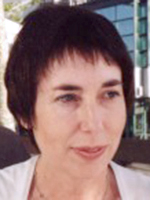
“I say yes to participating in research because knowing that other women live their lives as I do is comforting.”
– Diane, East Vancouver
While many people may think of their 20s as a time for “sowing wild oats,” 53-year-old Diane* knew by her early 20s that sex was not that important to her.
“Since then, slowly, over the years, I realized that I didn't feel the need for sexual relations,” says the East Vancouver resident. “I know that sex is important in a relationship to keep it healthy, but for me personally it isn't important at all.”
However, when Diane entered a relationship at 31 that is now her marriage, she knew she would have to try and keep interested in sex.
“As I’m in a long-term relationship, I have to muster all my strength to be intimate. And now, I also find my desire even lower having recently gone through menopause,” she says. “As I get older, I find I just don't care, but in order to keep my relationship going I need to do something.”
“I'm still trying to find ways to make sex more desirable for me,” says Diane.
When Diane read about a Vancouver Coastal Health Research Institute (VCHRI)/University of British Columbia (UBC) study looking at low sexual desire in women, she enquired about participating and hoped that the study would help.
“When I called, I was told that I wouldn't actually get any counselling or even the results for my situation, but that it would help to compile results for the future,” she explains. “I decided that I would be fine with that. My participation would help other women who have the same problem.”
VCHRI researcher Dr. Rosemary Basson is principal investigator for the Stress Hormones, Mood and Intimacy (MODEST) study, which aims to investigate the relationship between stress hormones (cortisol and DHEA), mood, and a history of stressors especially in childhood and adolescence in women with and without sexual desire complaints.
“Our hypothesis is that women with low desire may have abnormal stress response systems,” says Dr. Basson, a clinical professor in the Department of Psychiatry at UBC.
One objective of the study is to confirm Dr. Basson and her colleagues’ previous findings that the hormone dehydroepiandrosterone (DHEA) is lower in women with low desire.
“One may assume that because DHEA is lower in women with low sexual desire that the disorder is all about the lack of androgens (i.e. testosterone) because the body converts DHEA into testosterone; however, we’ve shown through our previous study that this may not be the case because testosterone levels were the same in the group of women with low sexual desire and women in our control group,” explains Dr. Basson.
“MODEST aims to confirm the finding of low DHEA in women with low desire and secondly, it will try to assess stress response hormones in a more detailed way,” explains Dr. Basson. “A random DHEA level does reflect stress hormones but more accurate measurements of both cortisol and DHEA will be made throughout the day.”
The UBC team is investigating whether the participants’ low sexual desire is connected primarily to the body’s stress response system affected by past history–which may include abuse, neglect or stress in childhood–and/or day-to-day depressive symptoms. DHEA may protect against depressive symptoms.
Dr. Basson hopes that the knowledge generated by the study will help women with low sexual desire, as well as their health care providers, to focus on the possibility of past stress having led to an inefficient stress response system and therefore leading to their lack of interest in sex.

Dr. Basson is sincerely grateful to participants like Diane for volunteering in the study.
“I really believe that this research will prevent harm to women with low desire from drugs and hormones that are not indicated,” says Dr. Basson.
For Diane, although she realizes that her participation in the study may not result in any difference in her own life, she still sees the value in taking part and not feeling so alone.
“Knowing that other women live their lives as I do is comforting.”
*Name has been changed to protect patient anonymity.
THIS IS ONE PATIENT’S STORY OF PARTICIPATING IN A CLINICAL TRIAL. YOUR EXPERIENCE MAY DIFFER. LEARN MORE ABOUT CLINICAL TRIALS BEFORE PARTICIPATING.


